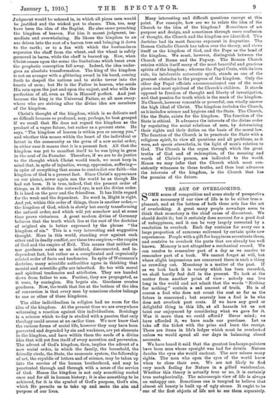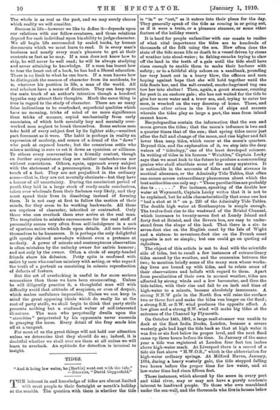THE ART OF OVERLOOKING.
SOME sense of composition and some study of perspective are necessary if our view of life is to be either true o pleasant, and at the bottom of both these arts lies the art of overlooking. A great many people nowadays seem to think that monotony is the chief cause of discontent. We should doubt it; but it certainly does account for a good deal of unhappiness, and it can be very largely corrected by a resolution to overlook. Each day contains for every one a large proportion of sameness enlivened by certain quite new experiences. People with a gift for happiness accentuate these, and contrive to overlook the parts that are already too well known. Memory is not altogether a mechanical record. We can resolve to remember part of a day as we resolve to remember part of a book. We cannot forget at will, but where slight impressions are concerned there is such a thing as crowding out. Monotony is a matter of the past. If as we look back it is variety which has been recorded, we shall hardly feel dull in the present. To look at the matter from another point of view : nobody can live long in the world and not admit that the words " Nothing for nothing " contain a sad amount of truth. He is of course a fool who does not count the coat so far as the future is concerned ; but scarcely less a fool is he who does not overlook past costs. If we have any good or delightful thing in this life, at all hazards let us not taint our enjoyment by considering what we gave for it. Was it more than we could afford ? Never mind ; we have afforded it, we have made our purchase. Let us take off the ticket with the price and burn the receipt. There are items in life's ledger which must be overlooked unless we would spend all our days in balancing closed accounts.
We have heard it said that the greatest landscape-painters have been men whose eyesight was bad for details. Nature dazzles the eyes she would enchant. The seer misses many sights. The men who open the eyes of the world know when to close their own. We are not likely to find very much feeling for Nature in a gifted watchmaker. Whether this theory is actually trite or no, it is certainly true metaphorically. The microscopic view of life is always an unhappy one. Sometimes one is tempted to believe that almost all beauty is built up of ugly atoms. It ought to be one of the first objects of life not to see them separately.
The whole is as real as the part, and we may surely choose which reality we will consider.
Success in life—however we like to define it—depends upon our relations with our fellow-creatures, and those relations depend for each individual upon his ability to judge character. We all begin life surrounded by sealed books, by human documents which we must learn to read. It is every man's business and nearly every man's pleasure to get at their contents as fast as he may. If a man does not know how to skip, he will never be well read; he will be always studying and never attaining to knowledge. If a man has learnt how to tear the heart out of a book, he has had a liberal education. There is no limit to what he can learn. If a man knows how to distinguish the essence of character from its accidents, be is, whatever his position in life, a man of the world. All real scholars have a sense of direction. They can keep upon the main track of an author's intention though a hundred bypaths may attract their thoughts. Much the same thing is true in regard to the study of character. There are so many false indications to be overlooked, superficial qualities which have no meaning, tricks of mind of no more significance than tricks of manner, copied mechanically from early associates, of which both mentally lazy and mentally over- worked men neglect to break themselves. Some serious men take hold of every subject first by its lighter side,—smallest part foremost as it were. The habit is perhaps in reality an expression of- modesty, and comes of a dread of the " dams" who peck at exposed hearts ; but the censorious critic who misses nothing is sure to set it down as cynicism or silliness. To others every conversation is a friendly contest, though on further acquaintance they are neither• cantankerous nor without convictions. Others, again, approach every subject with the statement of a preconception. It fades at the first touch of a fact. They are not prejudiced in the ordinary sense--that is, they are not mentally obstinate—but they have a horror of all uncertainty. During the omniscient period of youth they laid in a large stock of ready-made conclusions, taken over wholesale from their forbears very likely, and they must spend their lives in dissolving instead of forming them. It is not easy at first to follow the motion of their minds, for they seem to be working backwards. All these are caprices of character, inherited or contracted. Only those who can overlook them ever arrive at the real man. The temptation to mistake excrescences for the real stuff of personality comes very often from self-indulgence in a sort of spurious satire which feeds upon details. All men believe themselves to be humorous. It is perhaps the only delightful gift openly claimed nowadays without even a pretence at modesty. A power of minute and contemptuous observation is often mistaken by the unlucky owner for satiric humour ; and not only by the owner. Often a circle of empty-headed friends share his delusion. Petty spite is confused with satire by men who confuse mimicry with acting, or who regard the truth of a portrait as consisting in minute reproduction of defects of feature.
But the art of overlooking is useful in far more serious connexions than those we have been enumerating. *Unless he will diligently practise it, a thoughtful man will with difficulty avoid that attitude of suspicion, or even of despair, which makes usefulness impossible. Unless we can keep in mind the great opposing ideals which do really lie at the root of party strife, we shall begin to think that party strife presents nothing but a confused welter of self-interested ill-nature. The man who perpetually dwells upon the " atrocities " perpetrated by his opponents never succeeds in grasping the issue. Every detail of the fray sends him off at a tangent.
For most of us the great things will not hold our attention unless we determine that they should do so ; indeed, it is doubtful whether we shall ever see them at all unless we will learn to overlook. An aptitude for detection is inimical to insight.















































 Previous page
Previous page